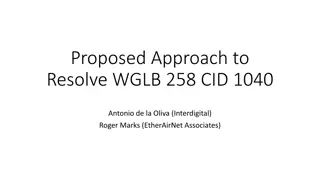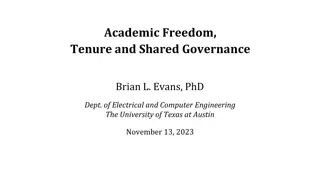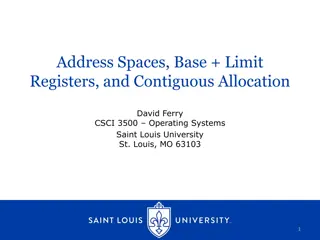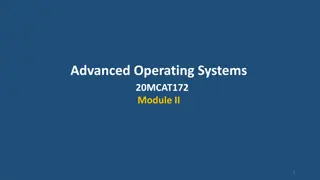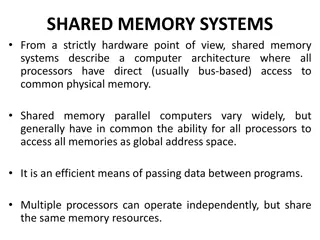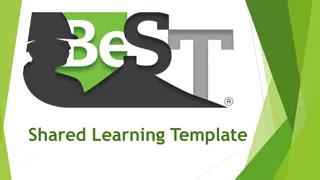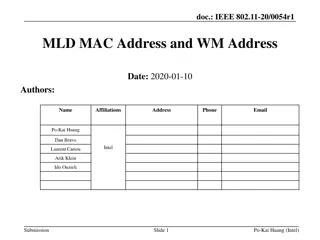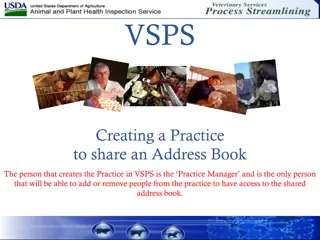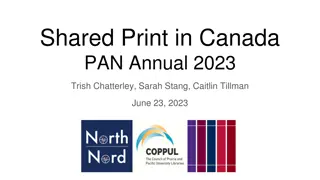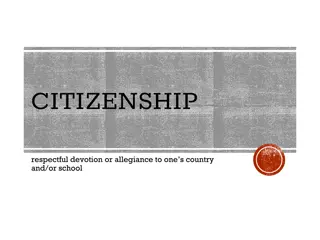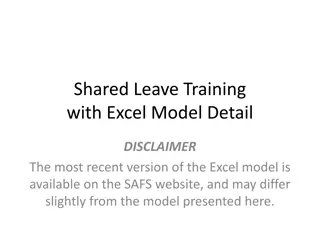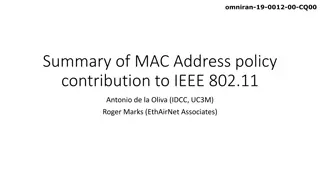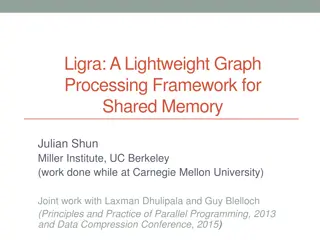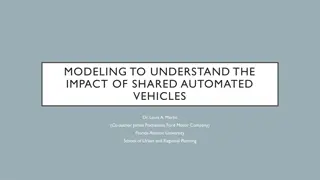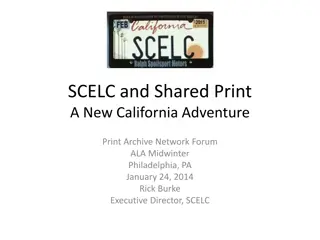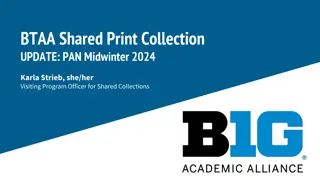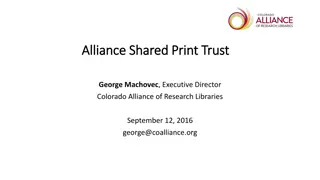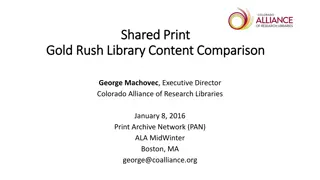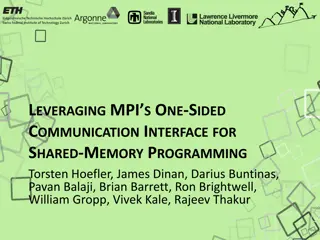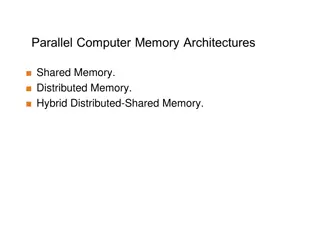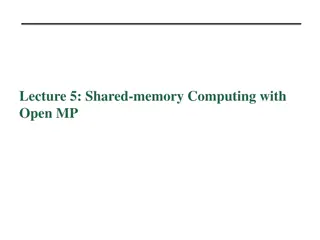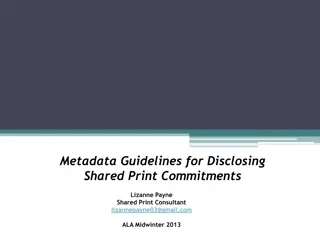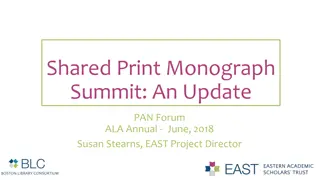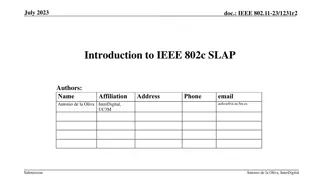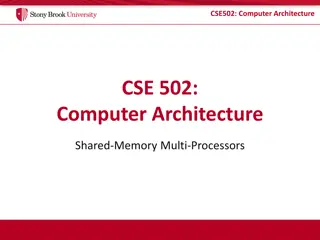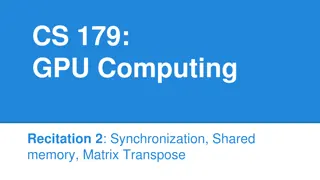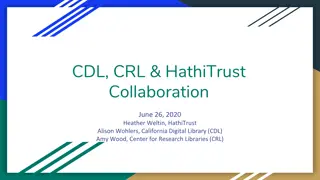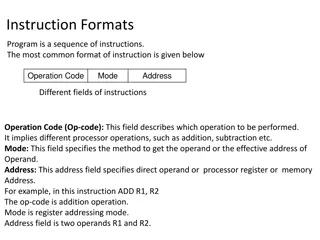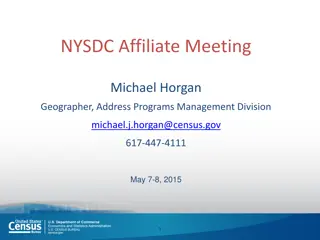Proposed Approach for MAC Address Assignment in IEEE 802.11
IEEE 802.1CQ is working on a mechanism to assign local MAC address blocks to end nodes specifically related to IEEE 802.11 standards. The current draft lacks a pre-association mechanism for IEEE 802.11 stations to obtain a local MAC address before association. The proposed remedy suggests specifying
6 views • 7 slides
Importance of Academic Freedom, Tenure, and Shared Governance in Higher Education
Academic freedom, tenure, and shared governance are crucial in higher education for fostering open inquiry, protecting faculty rights, and ensuring institutional integrity. Organizations like the American Association of University Professors (AAUP) advocate for these principles to uphold faculty aut
5 views • 9 slides
Guiding Lights_ The Importance of Home Address Signs.docx
In the tapestry of neighborhood home address signs truly stand like a beacon of identity safety guiding you and other delivery drivers to the destinations. But the importance of the humble Home Address sign is often ignored. In this guide you can explore the importance of home address signs.\n
1 views • 2 slides
Implementing Address Spaces: Base + Limit Registers
Address spaces, base + limit registers, and contiguous allocation are essential concepts in operating systems. Real mode memory addresses lack isolation between processes and pose limitations on multitasking. Virtual memory introduces virtual address spaces, requiring translation to physical address
3 views • 11 slides
Understanding Cladograms and Phylogenetic Analysis
Cladograms are used in cladistics to illustrate evolutionary relationships between organisms based on shared ancestral and derived characters. They are created by grouping species by common descent, forming clades that include an ancestral species and all its descendants. Valid clades are monophylet
0 views • 11 slides
Understanding Distributed Mutual Exclusion in Operating Systems
In distributed systems, the problem of mutual exclusion arises when multiple sites/processes need to access shared resources concurrently. Unlike in single-computer systems, distributed systems lack shared memory, leading to the need for communication-based approaches rather than shared variables li
0 views • 49 slides
Understanding Shared Memory Architectures and Cache Coherence
Shared memory architectures involve multiple CPUs sharing one memory with a global address space, with challenges like the cache coherence problem. This summary delves into UMA and NUMA architectures, addressing issues like memory latency and bandwidth, as well as the bus-based UMA and NUMA shared m
0 views • 27 slides
Understanding Shared Memory Systems in Computer Architecture
Shared memory systems in computer architecture allow all processors to have direct access to common physical memory, enabling efficient data sharing and communication among processors. These systems consist of a global address space accessible by all processors, facilitating parallel processing but
1 views • 19 slides
Enhancing Organizational Learning through BeSafe Taranaki Shared Learnings
BeSafe Taranaki Shared Learnings aims to facilitate cross-organizational learning by sharing insights from incidents and investigations. The focus is on identifying key lessons, target audiences, necessary process changes, and safety expectations. Two types of learnings are emphasized: Immediate Not
2 views • 9 slides
IEEE 802.11-20/0054r1 MLD MAC Address and WM Address
In the document IEEE 802.11-20/0054r1, the focus is on Multi-Link Framework for MLD address identification and differentiation. It explains the usage of MLD MAC address and STA WM medium address in wireless setups. The document also addresses the need for identifying different MLDs using MAC address
0 views • 16 slides
Creating a Shared Address Book in VSPS
Learn how to create a shared address book in VSPS by setting up a practice managed by the Practice Manager, who can add or remove users to access the address book. Follow step-by-step instructions to invite users and manage access to the shared address book efficiently.
0 views • 24 slides
Understanding Shared Memory Architectures and Cache Coherence
Shared memory architectures involve multiple CPUs accessing a common memory, leading to challenges like the cache coherence problem. This article delves into different types of shared memory architectures, such as UMA and NUMA, and explores the cache coherence issue and protocols. It also highlights
2 views • 27 slides
Shared Living Service Overview for Independent Living with Supports
The Shared Living Service, facilitated by Deanna L. Parker, MPA VA DBHDS, offers individuals aged 18 and above the opportunity to live independently with some support. This service is available under all three waivers and entails a one-to-one living arrangement where a roommate provides agreed-upon
0 views • 20 slides
Collaborative Shared Print Initiatives in Canadian Libraries: PAN Annual 2023
North/Nord initiative began in August 2021 to coordinate shared print efforts across Canadian libraries, focusing on Canadian materials. The program evaluation is set for Summer 2023, emphasizing collaboration for success. COPPUL SPAN expands on prioritizing partnerships, Indigenous publications, an
3 views • 5 slides
Understanding Citizenship: A Shared Identity and History
Explore the diverse perspectives on citizenship through respectful devotion to one's country or school. Discover what citizenship means to individuals in just six words and how it ties into shared histories and identities. Delve into the American Dream and the shared privilege it represents, emphasi
0 views • 18 slides
Excel Model for Shared Leave Training Detail
The Excel model for shared leave training detail allows school district employees to share leave both within and outside their district. The model facilitates the calculation of hourly salary rates and benefits for employees interested in participating in the shared leave program. The implementation
0 views • 12 slides
Effective Strategies for Shared Reading in Non-Fiction Settings
Shared reading in non-fiction is an effective approach to reinforce literacy skills while teaching subject-specific content. Teachers choose texts that match students' reading levels, are cross-curricular, and engaging. Discussions, predictions, vocabulary exploration, and historical context are int
0 views • 22 slides
Maine Shared Community Health Needs Assessment Androscoggin County Forum
Maine Shared Community Health Needs Assessment brings together various healthcare organizations to analyze health priorities in Androscoggin County. The forum includes presentations, discussions, and planning sessions to address key findings and identify health priorities.
0 views • 53 slides
Summary of MAC Address Policy Contribution to IEEE 802.11
This document outlines the contribution of MAC address policy to IEEE 802.11, focusing on defining ANQP and Beacon elements to convey information about addressing types supported by the network. It details how specific bits in the ANQP element represent support for various MAC address types includin
0 views • 5 slides
Ligra: A Lightweight Graph Processing Framework for Shared Memory
Ligra is a lightweight graph processing framework developed by Julian Shun during his time at the Miller Institute, UC Berkeley. This framework, created in collaboration with Laxman Dhulipala and Guy Blelloch, is designed for shared memory systems to efficiently analyze large graphs. Key features in
0 views • 21 slides
Introduction to Boston University's Shared Computing Cluster
Boston University's Shared Computing Cluster (SCC) provides researchers with access to a high-performance computing environment for running code, collaborating on shared data, and utilizing specialized software packages. With over 800 nodes, 20,000 processors, and hundreds of GPUs, the SCC offers re
0 views • 63 slides
Impact of Shared Automated Vehicles on Transportation System Performance
This study by Dr. Louis A. Merlin and James Fischelson explores the potential impact of shared automated vehicles on transportation systems. By reviewing 39 papers and simulations, the research delves into the implications of new shared automated modes, such as automated taxis, shuttles, and shared
0 views • 38 slides
SCELC Shared Print Feasibility Study Overview
Explore the goals and challenges of the SCELC Shared Print Feasibility Study, focusing on understanding member readiness, collection analysis, sustainability proposals, user behaviors, and cost analysis. The study aims to develop shared print programs to preserve and share print materials among dive
0 views • 12 slides
Transforming Big Ten Libraries through Shared Print Collections and Collective Action
Aspiration for a tremendous vision to unite Big Ten university collections into one shared and fully networked "BIG Collection." This initiative aims to increase findability, usability, and value at scale while deepening interdependence and resilience for an uncertain future. The Knowledge Commons w
1 views • 10 slides
Debate on Shared Sanitation: Improved or Not?
The discussion revolves around the classification of shared sanitation as improved or unimproved. WHO and UNICEF have a classification system where shared sanitation is considered unimproved due to concerns about cleanliness and accessibility. A proposed policy change by JMP seeks to include shared
0 views • 22 slides
Building a Shared Print Trust for Research Libraries
Colorado Alliance of Research Libraries, founded in 1981, spearheads the establishment of a Shared Print Trust to address the need for physical archiving in the digital age. By preserving intellectual records and promoting local control, the initiative ensures continued access to print materials. Th
0 views • 17 slides
Alliance Shared Print Program Overview
Colorado Alliance of Research Libraries established the Alliance Shared Print program focusing on distributed print repositories. The program allows libraries to voluntarily participate, maintain their holdings, and retain materials on behalf of the group. Key features include flexibility, no centra
0 views • 21 slides
Leveraging MPI's One-Sided Communication Interface for Shared Memory Programming
This content discusses the utilization of MPI's one-sided communication interface for shared memory programming, addressing the benefits of using multi- and manycore systems, challenges in programming shared memory efficiently, the differences between MPI and OS tools, MPI-3.0 one-sided memory model
0 views • 20 slides
Understanding Shared Memory, Distributed Memory, and Hybrid Distributed-Shared Memory
Shared memory systems allow multiple processors to access the same memory resources, with changes made by one processor visible to all others. This concept is categorized into Uniform Memory Access (UMA) and Non-Uniform Memory Access (NUMA) architectures. UMA provides equal access times to memory, w
0 views • 22 slides
Shared-Memory Computing with Open MP
Shared-memory computing with Open MP offers a parallel programming model that is portable and scalable across shared-memory architectures. It allows for incremental parallelization, compiler-based thread program generation, and synchronization. Open MP pragmas help in parallelizing individual comput
0 views • 25 slides
Understanding Address Translation in Computer Systems
Explore the concept of address translation in computer systems, covering topics such as converting virtual addresses to physical addresses, different translation methods, goals of address translation, bonus features, and a preview of MIPS address translation. Learn about the benefits and limitations
0 views • 60 slides
Metadata Guidelines for Disclosing Shared Print Commitments
Shared Print Metadata Guidelines aim to establish new Shared Print Institution Symbols and add them to bibliographic records for resource sharing. These guidelines involve creating MARC Local Holdings Records (LHRs) to document archiving commitments for journals. The Shared Print initiative supports
1 views • 12 slides
Shared Print Monograph Summit: Progress and Future Directions
The Shared Print Monograph Summit held in June 2018 focused on collaboration and coordination among North American shared print programs. Key priorities included open data on retention commitments, research on risks, establishing community standards, and more. Working groups were formed to address o
0 views • 24 slides
Introduction to IEEE 802c SLAP
IEEE 802c defines Local Medium Access Control (MAC) Address Usage, providing structured approaches through the Structured Local Address Plan (SLAP) in different regions of the local MAC address space. Local MAC addresses are not globally unique, and the assignment is within local administration's sc
0 views • 9 slides
Understanding Computer Architecture: Shared Memory Systems
Shared memory multiprocessors in computer architecture involve multiple threads using shared memory for communication, with synchronization complexities and implicit communication challenges. Despite these drawbacks, Shared Memory Systems have proven to be successful machines due to their evolutiona
0 views • 40 slides
Synchronization and Shared Memory in GPU Computing
Synchronization and shared memory play vital roles in optimizing parallelism in GPU computing. __syncthreads() enables thread synchronization within blocks, while atomic instructions ensure serialized access to shared resources. Examples like Parallel BFS and summing numbers highlight the need for s
0 views • 21 slides
Collaboration for Shared Print Collections: Vision, Mission, and Principles
This collaboration between HathiTrust, CDL, and CRL aims to enhance access to shared print collections, promote equity in scholarly resources, and leverage networks for collaborative infrastructure. The vision includes embedding shared print in library collections, enriching the scholarly record, an
0 views • 10 slides
Shared Stewardship Advisor Program Overview
The Shared Stewardship Advisor Program (S2A) aims to accelerate forest restoration and fuels reduction treatments through collaborative partnerships between USFS, CAL FIRE, and other stakeholders. By facilitating cross-boundary projects, advising on implementation strategies, and supporting funding
0 views • 7 slides
Understanding Different Instruction Formats in Computing
Instruction formats in computing include one-address, two-address, three-address, and zero-address instructions, each with specific ways of specifying operations and operands. One-address instructions utilize an implied accumulator register, while two-address and three-address instructions allow for
0 views • 18 slides
Geographic Support System Initiative (GSS-I) Overview
The Geographic Support System Initiative (GSS-I) aims to enhance address data quality through partnerships with tribal, state, county, and local governments. This program involves acquiring, verifying, and geocoding address data, with a focus on improving address coverage and spatial accuracy. Reeng
0 views • 20 slides
